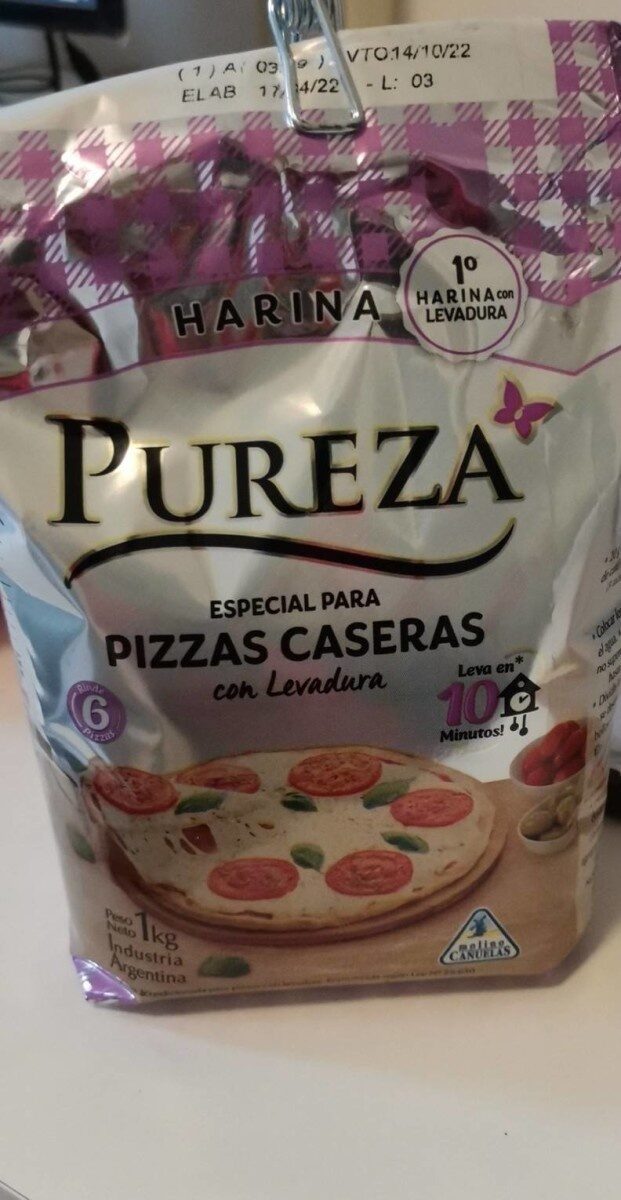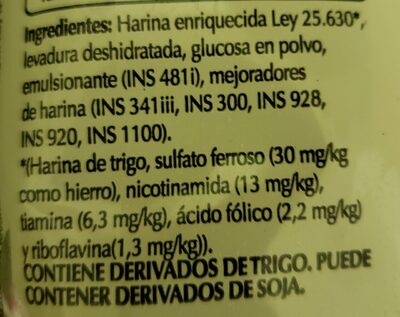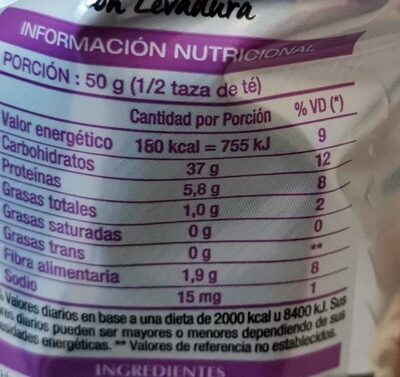Help us make food transparency the norm!
As a non-profit organization, we depend on your donations to continue informing consumers around the world about what they eat.
The food revolution starts with you!
Harina especial pizza casera con levadura - Pureza
Harina especial pizza casera con levadura - Pureza
This product page is not complete. You can help to complete it by editing it and adding more data from the photos we have, or by taking more photos using the app for Android or iPhone/iPad. Thank you!
×
Barcode: 7792180004567 (EAN / EAN-13)
Brands: Pureza, Molino Cañuelas
Categories: Plant-based foods and beverages, Plant-based foods, Cereals and potatoes, Bakery products, Pizza dough, Pizza pastry base
Manufacturing or processing places: Argentina
Countries where sold: Argentina
Matching with your preferences
Health
Ingredients
-
26 ingredients
enriched flour law 25,630*, dehydrated yeast, glucose powder, emulsifier (ins 481), flour improvers (ins 341iii, ins 300, ins 928, ins 920, ins 1100), wheat flour, ferrous sulfate (30 mg/kg as iron), nicotinamide (13 mg/kg), thiamine (6,3 mg/kg), folic acid (2,2 mg/kg) and riboflavin(1,3 mg/kg), contains trigo derivs, may contain soy derivativesAllergens: Gluten, Soybeans
Food processing
-
Ultra processed foods
Elements that indicate the product is in the 4 - Ultra processed food and drink products group:
- Additive: E481 - Sodium stearoyl-2-lactylate
- Ingredient: Emulsifier
- Ingredient: Glucose
Food products are classified into 4 groups according to their degree of processing:
- Unprocessed or minimally processed foods
- Processed culinary ingredients
- Processed foods
- Ultra processed foods
The determination of the group is based on the category of the product and on the ingredients it contains.
Additives
-
E1100 - Alpha-Amylase
Amylase: An amylase -- is an enzyme that catalyses the hydrolysis of starch into sugars. Amylase is present in the saliva of humans and some other mammals, where it begins the chemical process of digestion. Foods that contain large amounts of starch but little sugar, such as rice and potatoes, may acquire a slightly sweet taste as they are chewed because amylase degrades some of their starch into sugar. The pancreas and salivary gland make amylase -alpha amylase- to hydrolyse dietary starch into disaccharides and trisaccharides which are converted by other enzymes to glucose to supply the body with energy. Plants and some bacteria also produce amylase. As diastase, amylase was the first enzyme to be discovered and isolated -by Anselme Payen in 1833-. Specific amylase proteins are designated by different Greek letters. All amylases are glycoside hydrolases and act on α-1‚4-glycosidic bonds.Source: Wikipedia
-
E341 - Calcium phosphates
Calcium phosphate: Calcium phosphate is a family of materials and minerals containing calcium ions -Ca2+- together with inorganic phosphate anions. Some so-called calcium phosphates contain oxide and hydroxide as well. They are white solids of nutritious value.Source: Wikipedia
-
E341iii - Tricalcium phosphate
Calcium phosphate: Calcium phosphate is a family of materials and minerals containing calcium ions -Ca2+- together with inorganic phosphate anions. Some so-called calcium phosphates contain oxide and hydroxide as well. They are white solids of nutritious value.Source: Wikipedia
-
E481 - Sodium stearoyl-2-lactylate
Sodium stearoyl lactylate: Sodium stearoyl-2-lactylate -sodium stearoyl lactylate or SSL- is a versatile, FDA approved food additive used to improve the mix tolerance and volume of processed foods. It is one type of a commercially available lactylate. SSL is non-toxic, biodegradable, and typically manufactured using biorenewable feedstocks. Because SSL is a safe and highly effective food additive, it is used in a wide variety of products ranging from baked goods and desserts to pet foods.As described by the Food Chemicals Codex 7th edition, SSL is a cream-colored powder or brittle solid. SSL is currently manufactured by the esterification of stearic acid with lactic acid and partially neutralized with either food-grade soda ash -sodium carbonate- or caustic soda -concentrated sodium hydroxide-. Commercial grade SSL is a mixture of sodium salts of stearoyl lactylic acids and minor proportions of other sodium salts of related acids. The HLB for SSL is 10-12. SSL is slightly hygroscopic, soluble in ethanol and in hot oil or fat, and dispersible in warm water. These properties are the reason that SSL is an excellent emulsifier for fat-in-water emulsions and can also function as a humectant.Source: Wikipedia
-
E920 - L-cysteine
Cysteine: Cysteine -symbol Cys or C; - is a semi-essential proteinogenic amino acid with the formula HO2CCH-NH2-CH2SH. The thiol side chain in cysteine often participates in enzymatic reactions, as a nucleophile. The thiol is susceptible to oxidation to give the disulfide derivative cystine, which serves an important structural role in many proteins. When used as a food additive, it has the E number E920. It is encoded by the codons UGU and UGC. Cysteine has the same structure as serine, but with one of its oxygen atoms replaced by sulfur; replacing it with selenium gives selenocysteine. -Like other natural proteinogenic amino acids cysteine has -L- chirality in the older D/L notation based on homology to D and L glyceraldehyde. In the newer R/S system of designating chirality, based on the atomic numbers of atoms near the asymmetric carbon, cysteine -and selenocysteine- have R chirality, because of the presence of sulfur -resp. selenium- as a second neighbor to the asymmetric carbon. The remaining chiral amino acids, having lighter atoms in that position, have S chirality.-Source: Wikipedia
-
E928 - Benzole peroxide
Benzoyl peroxide: Benzoyl peroxide -BPO- is a medication and industrial chemical. As a medication it is used to treat mild to moderate acne. For more severe cases it may be used together with other treatments. Some versions come mixed with antibiotics such as clindamycin. Other uses include bleaching flour, hair bleaching, teeth whitening, and textile bleaching. It is also used in the plastic industry.Common side effects are skin irritation, dryness, or peeling. Use in pregnancy is of unclear safety. Benzoyl peroxide is in the peroxide family of chemicals. When used for acne it works by killing bacteria.Benzoyl peroxide was first made in 1905 and came into medical use in the 1930s. It is on the World Health Organization's List of Essential Medicines, the most effective and safe medicines needed in a health system. Benzoyl peroxide is available as a generic medication and over the counter. In the United Kingdom 150 ml of a 10% solution costs the NHS about £4. In the United States a month of treatment costs less than US$25.Source: Wikipedia
Ingredients analysis
-
May contain palm oil
Ingredients that may contain palm oil: E481
-
Vegan status unknown
Unrecognized ingredients: Enriched-flour-law-25-630, Ferrous sulfate, Kg-as-iron, Thiamin, 6-3-mg, Kg, Folic acid, 2-2-mg, Kg, 1-3-mg, Kg, Contains-trigo-derivs, DerivativesSome ingredients could not be recognized.
We need your help!
You can help us recognize more ingredients and better analyze the list of ingredients for this product and others:
- Edit this product page to correct spelling mistakes in the ingredients list, and/or to remove ingredients in other languages and sentences that are not related to the ingredients.
- Add new entries, synonyms or translations to our multilingual lists of ingredients, ingredient processing methods, and labels.
If you would like to help, join the #ingredients channel on our Slack discussion space and/or learn about ingredients analysis on our wiki. Thank you!
-
Vegetarian status unknown
Unrecognized ingredients: Enriched-flour-law-25-630, Ferrous sulfate, Kg-as-iron, Thiamin, 6-3-mg, Kg, Folic acid, 2-2-mg, Kg, 1-3-mg, Kg, Contains-trigo-derivs, DerivativesSome ingredients could not be recognized.
We need your help!
You can help us recognize more ingredients and better analyze the list of ingredients for this product and others:
- Edit this product page to correct spelling mistakes in the ingredients list, and/or to remove ingredients in other languages and sentences that are not related to the ingredients.
- Add new entries, synonyms or translations to our multilingual lists of ingredients, ingredient processing methods, and labels.
If you would like to help, join the #ingredients channel on our Slack discussion space and/or learn about ingredients analysis on our wiki. Thank you!
-
Details of the analysis of the ingredients
We need your help!
Some ingredients could not be recognized.
We need your help!
You can help us recognize more ingredients and better analyze the list of ingredients for this product and others:
- Edit this product page to correct spelling mistakes in the ingredients list, and/or to remove ingredients in other languages and sentences that are not related to the ingredients.
- Add new entries, synonyms or translations to our multilingual lists of ingredients, ingredient processing methods, and labels.
If you would like to help, join the #ingredients channel on our Slack discussion space and/or learn about ingredients analysis on our wiki. Thank you!
en: enriched flour law 25‚630, yeast, glucose powder, emulsifier (e481), flour improvers (e341iii, e300, e928, e920, e1100), wheat flour, ferrous sulfate (kg as iron), nicotinamide, thiamine (6‚3 mg, kg), folic acid (2‚2 mg, kg), riboflavin (1‚3 mg, kg), contains trigo derivs, derivatives- enriched flour law 25‚630 -> en:enriched-flour-law-25-630 - percent_min: 7.69230769230769 - percent_max: 100
- yeast -> en:yeast - vegan: yes - vegetarian: yes - percent_min: 0 - percent_max: 50
- glucose powder -> en:glucose-powder - vegan: yes - vegetarian: yes - ciqual_proxy_food_code: 31016 - percent_min: 0 - percent_max: 33.3333333333333
- emulsifier -> en:emulsifier - percent_min: 0 - percent_max: 25
- e481 -> en:e481 - vegan: maybe - vegetarian: maybe - from_palm_oil: maybe - percent_min: 0 - percent_max: 25
- flour improvers -> en:flour-treatment-agent - percent_min: 0 - percent_max: 20
- e341iii -> en:e341iii - vegan: yes - vegetarian: yes - percent_min: 0 - percent_max: 20
- e300 -> en:e300 - vegan: yes - vegetarian: yes - percent_min: 0 - percent_max: 10
- e928 -> en:e928 - vegan: yes - vegetarian: yes - percent_min: 0 - percent_max: 6.66666666666667
- e920 -> en:e920 - vegan: maybe - vegetarian: maybe - percent_min: 0 - percent_max: 5
- e1100 -> en:e1100 - vegan: yes - vegetarian: yes - percent_min: 0 - percent_max: 4
- wheat flour -> en:wheat-flour - vegan: yes - vegetarian: yes - ciqual_proxy_food_code: 9410 - percent_min: 0 - percent_max: 16.6666666666667
- ferrous sulfate -> en:ferrous-sulfate - percent_min: 0 - percent_max: 14.2857142857143
- kg as iron -> en:kg-as-iron - percent_min: 0 - percent_max: 14.2857142857143
- nicotinamide -> en:e375 - vegan: maybe - vegetarian: maybe - percent_min: 0 - percent_max: 12.5
- thiamine -> en:thiamin - percent_min: 0 - percent_max: 11.1111111111111
- 6‚3 mg -> en:6-3-mg - percent_min: 0 - percent_max: 11.1111111111111
- kg -> en:kg - percent_min: 0 - percent_max: 5.55555555555556
- folic acid -> en:folic-acid - percent_min: 0 - percent_max: 10
- 2‚2 mg -> en:2-2-mg - percent_min: 0 - percent_max: 10
- kg -> en:kg - percent_min: 0 - percent_max: 5
- riboflavin -> en:e101 - vegan: maybe - vegetarian: yes - percent_min: 0 - percent_max: 9.09090909090909
- 1‚3 mg -> en:1-3-mg - percent_min: 0 - percent_max: 9.09090909090909
- kg -> en:kg - percent_min: 0 - percent_max: 4.54545454545455
- contains trigo derivs -> en:contains-trigo-derivs - percent_min: 0 - percent_max: 8.33333333333333
- derivatives -> en:derivatives - percent_min: 0 - percent_max: 7.69230769230769
Nutrition
-
Very good nutritional quality
⚠ ️Warning: the amount of fruits, vegetables and nuts is not specified on the label, it was estimated from the list of ingredients: 0This product is not considered a beverage for the calculation of the Nutri-Score.
Positive points: 8
- Proteins: 5 / 5 (value: 11.6, rounded value: 11.6)
- Fiber: 3 / 5 (value: 3, rounded value: 3)
- Fruits, vegetables, nuts, and colza/walnut/olive oils: 0 / 5 (value: 0, rounded value: 0)
Negative points: 3
- Energy: 3 / 10 (value: 1339, rounded value: 1339)
- Sugars: 0 / 10 (value: 0, rounded value: 0)
- Saturated fat: 0 / 10 (value: 0, rounded value: 0)
- Sodium: 0 / 10 (value: 30, rounded value: 30)
The points for proteins are counted because the negative points are less than 11.
Nutritional score: (3 - 8)
Nutri-Score:
-
Nutrient levels
-
Fat in moderate quantity (3%)
What you need to know- A high consumption of fat, especially saturated fats, can raise cholesterol, which increases the risk of heart diseases.
Recommendation: Limit the consumption of fat and saturated fat- Choose products with lower fat and saturated fat content.
-
Saturated fat in low quantity (0%)
What you need to know- A high consumption of fat, especially saturated fats, can raise cholesterol, which increases the risk of heart diseases.
Recommendation: Limit the consumption of fat and saturated fat- Choose products with lower fat and saturated fat content.
-
Sugars in low quantity (0%)
What you need to know- A high consumption of sugar can cause weight gain and tooth decay. It also augments the risk of type 2 diabetes and cardio-vascular diseases.
Recommendation: Limit the consumption of sugar and sugary drinks- Sugary drinks (such as sodas, fruit beverages, and fruit juices and nectars) should be limited as much as possible (no more than 1 glass a day).
- Choose products with lower sugar content and reduce the consumption of products with added sugars.
-
Salt in low quantity (0.075%)
What you need to know- A high consumption of salt (or sodium) can cause raised blood pressure, which can increase the risk of heart disease and stroke.
- Many people who have high blood pressure do not know it, as there are often no symptoms.
- Most people consume too much salt (on average 9 to 12 grams per day), around twice the recommended maximum level of intake.
Recommendation: Limit the consumption of salt and salted food- Reduce the quantity of salt used when cooking, and don't salt again at the table.
- Limit the consumption of salty snacks and choose products with lower salt content.
-
-
Nutrition facts
Nutrition facts As sold
for 100 g / 100 mlCompared to: Pizza pastry base Energy 1,339 kj
(320 kcal)+6% Fat 3 g +8% Saturated fat 0 g -100% Carbohydrates 74 g +28% Sugars 0 g -100% Fiber 3 g +4% Proteins 11.6 g +28% Salt 0.075 g -94% Fruits‚ vegetables‚ nuts and rapeseed‚ walnut and olive oils (estimate from ingredients list analysis) 0 %
Environment
-
Eco-Score B - Low environmental impact
⚠ ️Select a country in order to include the full impact of transportation.The Eco-Score is an experimental score that summarizes the environmental impacts of food products.→ The Eco-Score was initially developped for France and it is being extended to other European countries. The Eco-Score formula is subject to change as it is regularly improved to make it more precise and better suited to each country.Life cycle analysis
-
Average impact of products of the same category: A (Score: 91/100)
Category: Pizza base, raw
Category: Pizza base, raw
- PEF environmental score: 0.18 (the lower the score, the lower the impact)
- including impact on climate change: 1.13 kg CO2 eq/kg of product
Stage Impact Agriculture
38.0 %Processing
18.1 %Packaging
12.3 %Transportation
8.3 %Distribution
4.9 %Consumption
18.5 %
Bonuses and maluses
-
Origins of ingredients with a high impact
Malus: -5
Environmental policy: -5
Transportation: 0
Origin of the product and/or its ingredients % of ingredients Impact Unknown 100 %High Kyrgyzstan 0 %High
-
Missing packaging information for this product
Malus: -15
⚠ ️ The information about the packaging of this product is not filled in.⚠ ️ For a more precise calculation of the Eco-Score, you can modify the product page and add them.
If you are the manufacturer of this product, you can send us the information with our free platform for producers.
Eco-Score for this product
-
Impact for this product: B (Score: 71/100)
Product: Harina especial pizza casera con levadura - Pureza
Life cycle analysis score: 91
Sum of bonuses and maluses: -20
Final score: 71/100
-
Carbon footprint
-
Equal to driving 0.6 km in a petrol car
113 g CO² per 100g of product
The carbon emission figure comes from ADEME's Agribalyse database, for the category: Pizza base, raw (Source: ADEME Agribalyse Database)
Stage Impact Agriculture
32.1 %Processing
15.1 %Packaging
24.0 %Transportation
17.4 %Distribution
3.3 %Consumption
8.2 %
Packaging
-
Missing packaging information for this product
⚠ ️ The information about the packaging of this product is not filled in.Take a photo of the recycling information Take a photo of the recycling information
Transportation
-
Origins of ingredients
Origins of ingredients with a high impact
Origin of the product and/or its ingredients % of ingredients Impact Unknown 100 %High Kyrgyzstan 0 %High
Report a problem
-
Incomplete or incorrect information?
Category, labels, ingredients, allergens, nutritional information, photos etc.
If the information does not match the information on the packaging, please complete or correct it. Open Food Facts is a collaborative database, and every contribution is useful for all.
Data sources
Product added on by veganeamos
Last edit of product page on by guezguez-majed.
Product page also edited by ecoscore-impact-estimator, flipwared, inf, kiliweb, openfoodfacts-contributors, roboto-app, yuka.sY2b0xO6T85zoF3NwEKvln5fWsTargvBEkzlvE-o-_qBB43qRNxg3bSiLKg.










